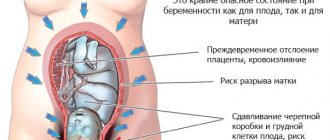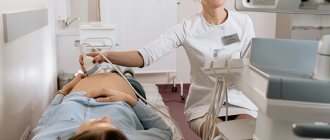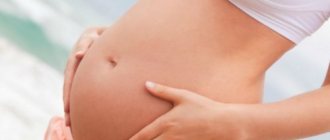Pregnancy is a long-awaited event for many women. In the hope of conceiving, they begin to listen carefully to their body, waiting for signs of successful fertilization. Many mothers note that after conception they felt that their stomach hurt and pulled. Could this symptom indicate pregnancy? In what cases is it a sign of pathology?
Causes of pain after conception
The causes of pain spreading in the lower abdomen after conception can be due to both hormonal changes occurring in the body and the presence of pathology. To understand why pain occurs, it is necessary to understand how the fertilization process occurs.
After maturation and rupture of the follicle, the egg begins its movement through the fallopian tubes. It is during this period - sometimes later, when it has almost reached the uterus - that it meets the sperm that fertilizes it. A week after fertilization, the resulting zygote is fixed in the uterine cavity and begins its development.
Some women report experiencing distinct pain as the fertilized egg attaches to the wall of the uterus. This is a short, but quite noticeable pain. Sometimes the moment of implantation is accompanied by light bleeding: a few drops of blood appear on the underwear.
Can my stomach hurt after conception? As gynecological practice shows, yes. Many women report mild pain and tingling in the uterus. But the main sign of pregnancy is the absence of monthly bleeding.
The reason why the stomach hurts after conception is uterine contractions. The woman’s body perceives the attached fertilized egg as a foreign element and tries to get rid of the “invader”. The woman experiences nagging pain.
Preservation of pregnancy helps to weaken the immune defense under the influence of hormones responsible for the development of gestation. Thanks to this, the fertilized egg is fixed more and more firmly and begins active development.
Signs of conception
After fertilization, the egg moves through the fallopian tube into the uterus within 7–9 days, where it attaches to its wall. If implantation is successful, pregnancy occurs. From this moment on, the mother's body provides the embryo with nutrients and oxygen. The attachment of the egg after fertilization is often accompanied by nagging pain, which is explained by damage to the mucous membrane. After implantation, active hormonal changes begin, leading to changes in the woman’s body.
Early signs of successful attachment of the egg to the uterine wall are:
- increased thickness and viscosity of vaginal discharge;
- increase in basal temperature to 37–37.5°C;
- an increase in the level of human chorionic gonadotropin, a hormone produced by the membranes of the embryo;
- heaviness in the pelvic area;
- swelling, soreness and increased sensitivity of the mammary glands;
- nausea, digestive disorders;
- slight bleeding, which is observed for 1–2 days and is explained by damage to the endometrium - the inner surface of the uterine cavity;
- fatigue, weakness, drowsiness;
- mood swings, tearfulness.
Signs of successful conception in each specific case are individual and depend on the health status of the expectant mother, her hormonal levels and body characteristics. Some women do not feel any changes, while others experience all the described signs together.
Symptoms
Symptoms that occur during fertilization and implantation of the egg may not occur in all women. Pain can be felt in different ways: sometimes the lower abdomen pulls, colitis, a woman may feel slight discomfort, etc.
Many women experience abdominal pain after conception.
Does a healthy woman have a stomach ache after conception? In some cases, yes. And this pain becomes evidence of successful attachment of the embryo to the wall of the uterus.
How long after conception can pain appear, indicating the beginning of gestation? Sometimes this can happen on the second day, and sometimes after a week from conception. During this time, the fertilized egg actively moves through the fallopian tubes to end up in the uterine cavity and become embedded in its mucous membrane.
The hormonal changes that occur in the female body over the next few days lead to some change in the size of the uterus. It is this transformation - an increase in the volume of muscle fibers and the middle layers of the endometrium - that can “make” the uterus hurt.
Why does my stomach hurt during pregnancy?
These are harmless pains caused only by ongoing physiological changes taking place in the body. They may feel tugging.
It is worth noting that there can be no talk of a miscarriage: the embryo is not yet connected to the mother’s body, so there is no risk of abortion.
Pain in the lower abdomen after fertilization has occurred is one of the signs of pregnancy. They occur during the period of attachment of the embryo to the wall of the uterus. And the slight bleeding that occurs indicates the successful introduction of the egg into the mucous membrane of the organ.
In addition to pain, another sign of successful conception is chest pain. The mammary glands fill up and become more sensitive. Breasts increase in size in a short time.
Should you see a doctor?
Pain in the lower abdomen is a common symptom that can be caused by both physiological changes during conception and pathological conditions during pregnancy, as well as diseases of the genitourinary and digestive systems.
If the test revealing an increase in hCG levels is positive, then slight discomfort may be due to physiological reasons. You should consult a doctor if you experience intense, increasing pain, often worsening after sexual intercourse, which is accompanied by the following accompanying symptoms:
- bloody discharge;
- frequent painful urination;
- increased body temperature, chills;
- nausea, vomiting, diarrhea, constipation, loss of appetite;
- changes in the quantity, smell, color of daily discharge, the appearance of pus and blood in them;
- weakness, fatigue;
- painful menstruation.
Pathological pain
Sometimes the embryo’s attempts to qualitatively gain a foothold in the surface of the mucosa are unsuccessful. And then the pregnancy is terminated. The onset of bleeding almost coincides with the first days of normal menstruation, slightly delayed. The woman will not even know that she was pregnant.
But if you already know about pregnancy, and there is bloody discharge on your underwear, accompanied by pain, then you need to lie down and call an ambulance.
Stomach pain after conception may occur due to hormonal imbalances. Problems arise if a woman’s body does not have enough hormones responsible for the development of gestation. At the very beginning, their proper level is ensured by the corpus luteum, which temporarily performs the duties of the placenta.
Corpus luteum cyst is one of the quite common pathologies
It is formed at the site of a burst follicle and ensures the production of the required volume of progesterone. Later - by about 4 months - the formed placenta will take on these responsibilities. Lack of progesterone can cause spontaneous abortion or pregnancy failure: in both cases, the embryo dies.
When there is a threat of miscarriage, a woman is bothered by pain in the lower abdomen of a cramping nature, radiating to the lumbar area. If a pregnant woman develops such symptoms, it is recommended to obtain an urgent consultation with a gynecologist.
To identify the cause, she will receive a referral for a biochemical blood test to determine the content of pregnancy hormones. After receiving the results, the woman will begin to receive treatment that will allow her to maintain the gestation that has begun.
Another cause of pathological pain after conception is a corpus luteum cyst. It begins to actively increase in size, which is caused by the accumulation of fluid in its cavity. This pathology may be accompanied by nagging pain felt in the lower abdomen.
Treatment for this pathology is not provided, but the woman must give up any physical activity and sports activities. Otherwise, the cyst may rupture, which threatens severe internal bleeding.
To independently monitor progesterone levels, gynecologists recommend keeping a basal temperature chart. The measurement must be taken at the same time, without getting out of bed. The thermometer should be inserted into the rectum and held for about 5 minutes. During the first trimester, temperature readings should be higher than 37 degrees.
If her readings are lower, the doctor may suspect a lack of pregnancy hormones. As a rule, medications such as Duphaston or Utrozhestan, folic acid, and vitamin E are prescribed. The decision on the duration of taking the drug is made by the gynecologist leading the pregnancy.
A severe painful syndrome in the initial stages can be a symptom of an ectopic pregnancy. This happens when the fertilized egg is implanted not in the uterine cavity, but in the tubes. As it develops, it causes a pathological expansion of its lumen and ultimately rupture. The pathology is accompanied by severe bleeding and requires immediate hospitalization.
Ectopic pregnancy is a life-threatening condition for a woman
Increased uterine tone may also be a problem. Taking No-Shpa helps relieve the condition.
Characteristics of the fertilization process
Fertilization of a cell is the beginning of the formation of a new organism. This is a rather complex process, the completion of which requires the presence of certain conditions. The importance of this process lies in the fact that without it further development of the fetus and the birth of a child are impossible. During fertilization, the fusion of male and female reproductive cells occurs. As a result, an embryo is formed, from which a new organism then develops. Accordingly, if sexual fertilization has not occurred, then pregnancy will not develop. Under natural conditions, this process occurs in the ampullary section of the fallopian tubes. Therefore, with tubal pathology, the egg cannot meet the sperm and fertilization does not occur. Also one of the reasons for the lack of fertilization is anovulation. Without the release of the egg from the ovary, the formation of an embryo cannot occur.
Many couples are interested in the question of whether there are any specific signs of fertilization. Today, despite the high development of medical technology, it is almost impossible to determine the moment of conception. Therefore, it is important to know how long it takes for fertilization to be detected using laboratory research methods. It can only be diagnosed after about a week. Initially, this can be determined by the presence of a certain dip in basal temperature associated with implantation. Signs of fertilization also include the appearance of implantation bleeding. Often it has the appearance of spotting discharge. This symptom is not typical for all expectant mothers. In general, signs of fertilization are very non-specific, therefore, it is not possible to determine the presence of fertilization before the delay occurs. It is believed that the likelihood of a cell being fertilized increases during ovulation, or when an egg is released from the ovary. To increase the likelihood of conception, sexual intercourse is recommended several days before ovulation and for 2-3 days after it.
Pain syndrome not caused by pregnancy
After conception, a woman may experience pain that is in no way related to pregnancy:
- If pain is felt in the lower right quadrant of the abdomen, then the cause may be an attack of acute appendicitis. The pathology requires urgent hospitalization and surgical treatment.
- Intestinal disorders and infectious pathologies can cause pain. In this case, they are accompanied by secondary symptoms - diarrhea, nausea/vomiting, increased gas formation.
- The acute form of cholecystitis, pancreatitis, and intestinal obstruction are accompanied by severe pain. Conditions require urgent medical consultation and hospitalization.
Abdominal pain after conception can be caused by both pathological and physiological conditions. But if the sensations cause significant discomfort and anxiety, then you need to report them to the gynecologist.










